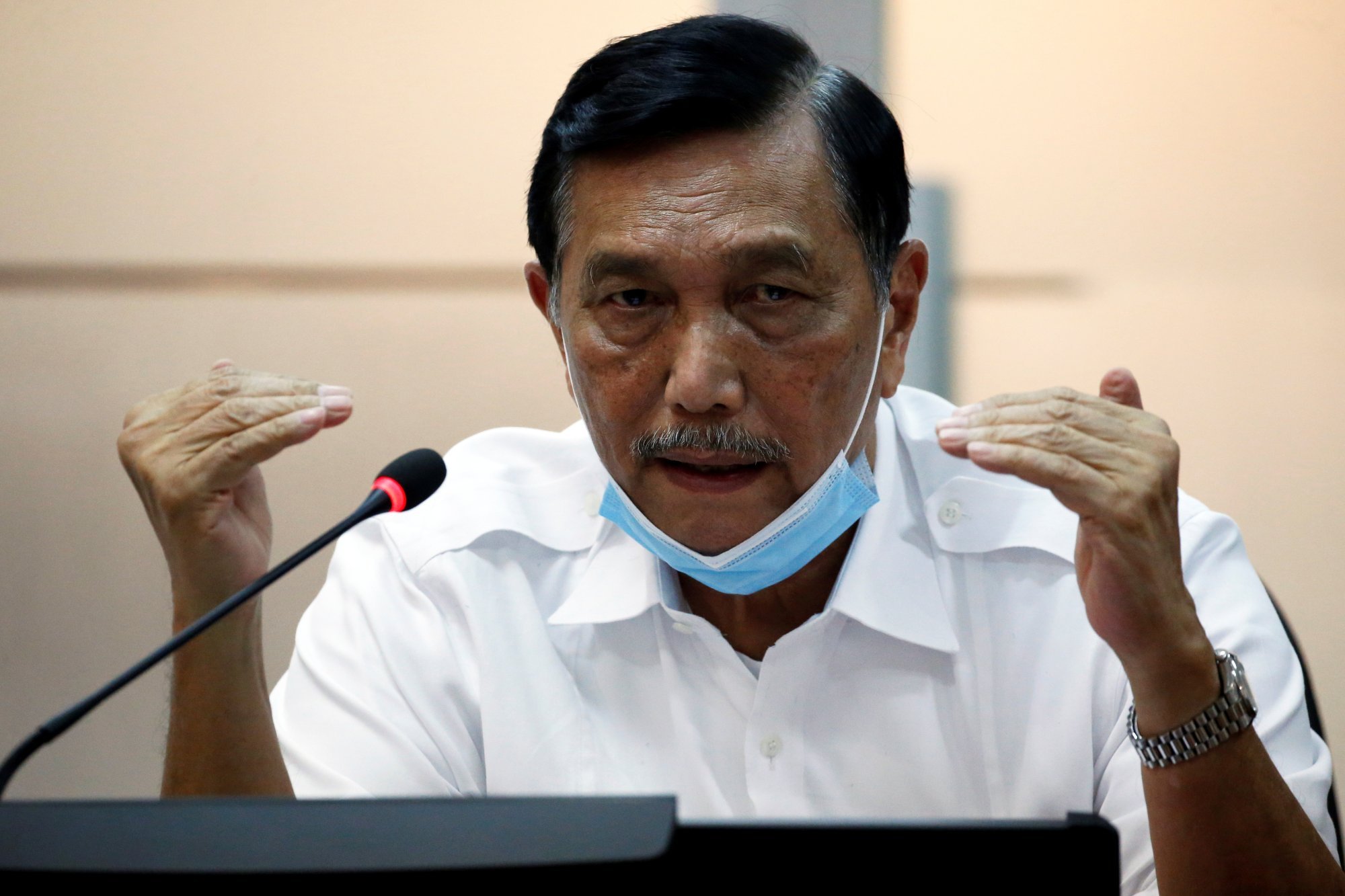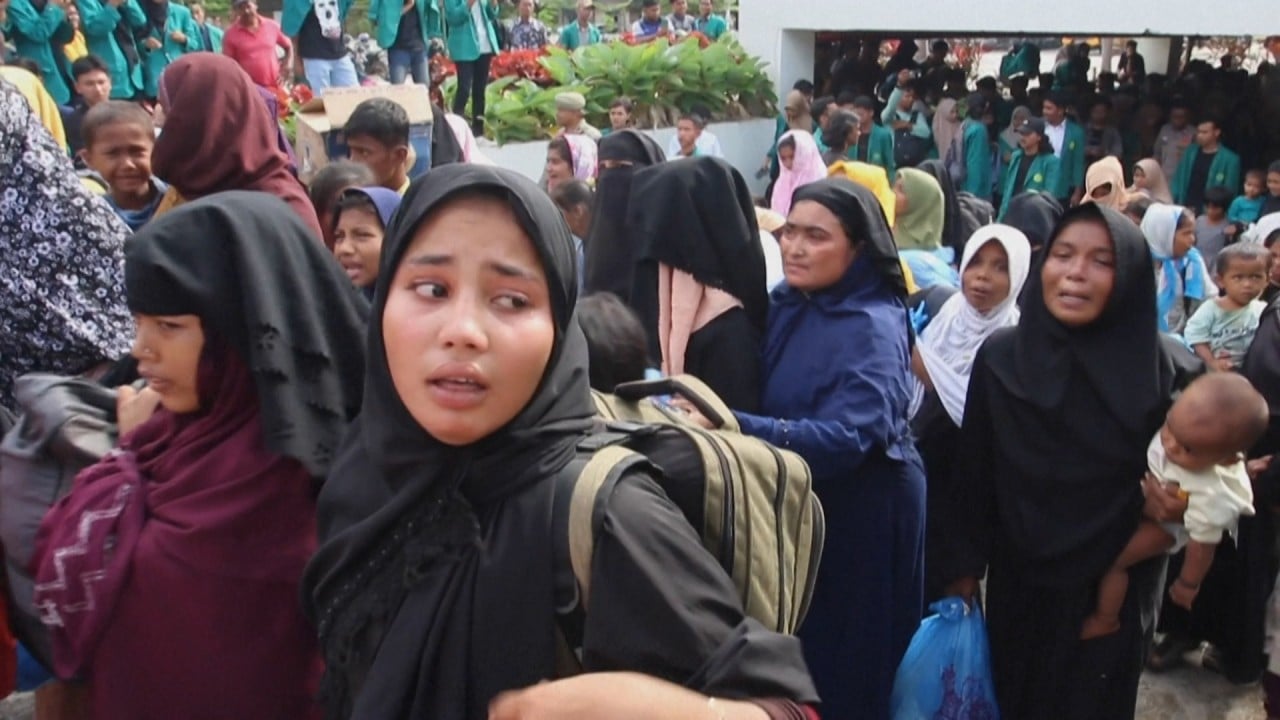Acquittal of 2 Indonesian activists puts spotlight on law decried as a tool to silence political critics
[ad_1]
Haris, co-founder of human rights and pro-democracy Lokataru Foundation, and Fatia, former coordinator at the Commission for the Disappeared and Victims of Violence (Kontras), were investigated by the police in Jakarta in September 2021 following Luhut’s report.
‘Power does not last’, Indonesia’s ex-leader Megawati says in jab at Jokowi
‘Power does not last’, Indonesia’s ex-leader Megawati says in jab at Jokowi
In the video, the duo discussed a research report about several companies being involved in mining operations in Papua including one reportedly owned by Luhut. The minister has vehemently denied the report, saying that he did not have any business in the region.
Speaking after their acquittal, Haris told This Week in Asia: “We are happy and surprised by the court’s decision because we are fighting against an authoritarian regime so we thought that we would definitely be punished. Fortunately, the judiciary did not follow the drumbeat of authoritarian rulers’ arbitrariness.
“With this win, we want to tell the public that no ruler should be too dominant at every level.”
Luhut’s police report kick-started a long-drawn trial process, which saw the activists appear in court 32 times. Prosecutors had urged the court to sentence Fatia and Haris three-and-a-half years, and four years in prison, respectively. Luhut also sought 100 billion rupiah (US$6.4 million) in compensation from the duo.

Eventually, the court ruled that the duo did not intend to defame Luhut and that the word ‘lord’ had been widely used by the public. Both activists were also found not guilty of spreading misinformation as they had quoted research by civil groups in their video discussion about Luhut’s business interests.
The Attorney General’s office has filed an appeal against the acquittal to the Supreme Court. Luhut on Monday said he respected the court’s ruling but he “regretted” that “several important facts” were not considered by the judges.
Fatia said: “Certainly, I am relieved. But we still have to face the appeal process. We will have to continue to prove that what we did was not defaming someone but discussing matters of public interest and accountability of state officials.”
The verdict was welcomed by the Asean Parliamentarians for Human Rights, with Malaysian member of parliament Yuneswaran Ramaraj urging “the prosecution to refrain from appealing the ruling as Fatia and Haris should never have been charged in the first place”.
“We remain concerned that the Information and Electronic Transactions Law … remains all too easily misused to suppress political criticism and dissent,” Ramaraj said in a statement.
Centre-left party seeks to shake up ‘hackneyed ideas’ in Indonesia politics
Centre-left party seeks to shake up ‘hackneyed ideas’ in Indonesia politics
Draconian law
A person who is convicted under the ITE Law faces a maximum jail term of four years and a fine of up to 750 million rupiah (US$48,168).
Haris said the duo were offered a choice to have the case settled by issuing an apology to Luhut.
“I said I didn’t want to because I did nothing wrong. Secondly, I think it is important to show the public that we can, and we must fight,” Haris said. The duo’s court victory was bittersweet as the freedoms of “many of our friends are still constrained due to the threatening [ITE] law”, he added.
Nenden Sekar Arum, executive director at Jakarta-based Southeast Asia Freedom of Expression Network, or Safenet, said the case against the two activists under the ITE Law was “just the tip of the iceberg”.
“The use of the ITE Law to silence activists or critical members of the public is still rampant in Indonesia. This is a lesson for law enforcers, that opinions cannot be punished. This can be applied to other cases that are still ongoing in the police or prosecutor’s office,” Nenden said.
According to Amnesty International Indonesia, between 2019 and 2023, the ITE Law was “misused” in at least 504 cases filed against 535 people, including activists, journalists and academics. The duo’s acquittal was a “rare” victory given that Jakarta-based Institute for Criminal Justice Reform said in 2021 that the law’s conviction rate was 96.8 per cent, Nenden said.
Following widespread criticisms of the law, its revision was passed by the Indonesian parliament in December.
In the revised law, an individual cannot be criminalised if they disseminate information that is of public interest. Nonetheless, legal provisions empowering the prosecution of anyone for spreading online content that is deemed defamatory or hate speech are still in place.
MasterChef Indonesia faces heat over winner as ethnic tensions simmer
MasterChef Indonesia faces heat over winner as ethnic tensions simmer
Human rights activists are still critical of the law, with the International Commission of Jurists saying last month that the revision still “does not comply with international human rights law and standards on freedom of expression and information”.
It added: “The revision process lacked transparency, and important recommendations made by civil society to remove the ITE Law’s fatally flawed provisions have been disregarded.”
Fatia and Haris are hopeful that their case will give hope and courage to others who are facing similar charges as they had.
“As long as the ITE Law still exists, people’s freedom of expression is still vulnerable … Similar encouragement must also be given to other victims of [the law], whose trials are still ongoing. They must also be free,” Fatia said.
[ad_2]
Source link


